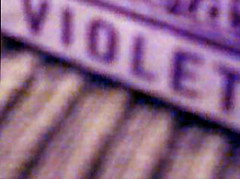Ratatouille. Disney Pictures and Pixar Animation Studios. 7/2/07.
Spoilers in this one: Read a proper review instead if you haven't seen the movie and don't want to know what happens; they're all pretty much glowing.
Ratatouille may be the most complex, detailed, visually stimulating animated movie I have ever seen. Throughout the film I was intellectually and critically engaged, while marvelling at the beautiful visual imagery and the amazing detail of every scene. As I'm sure you know, Ratatouille is the story of a rat who wants to be a chef, so he teams up with a clumsy kitchen underling who is "good at looking human" to be his beard. Remy, the rat, provides the artistic genius while human Alfredo Linguini provides the manual labor. Reviews offerBrad Bird extensive and well-deserved praise as the creative genius behind this film about artistic creation.
First and foremost, this movie is sensory delight. Action sequences feature amazing clarity and exhilarating sense of motion, while the details of the individual characters, human and rat, are rendered in impecable specificity. Color and texture delight the eye, while the depiction of tastes and scents through sight and sound translate the pleasures of the kitchen into the pleasures of spectatorship.
Besides taking joy in art of all kinds, Ratatouille takes a firm stand about relationships to food and the importance of cooking, with the evil producer and marketer of frozen food as the unmitigated villian of the piece. The film emphatically and repeatedly states "anyone can cook," implying that everyone should, despite the fact that Remy's cooking skills are at least partially the result of an innate gift (his sense of smell). This tension between cooking as inherent genius and as an art that everyone should practice paralells the tension between the inherent snootiness of haute cuisine in a Parisian restaurant and the conception of cooking as tasting fresh, simple foods and putting them together. Even the signature ratatouille of the film is a simple vegetable dish evokative of peasant fare and home cooking. While the film aims to be accessible, it does ultimately preach that everyone (even rats) can and should appreciate the finest of cuisine.
Ratatouille even featured small bits of feminism in the form of the only real female character, Colette. Voiced by Janeane Garofalo, Colette calls attention to the inequality of the professional kitchen in which she has to work twice as hard and be tough as nails. Besides, who doesn't love a girl with purple hair and sharp knives?
As an aspiring critic myself, I found the film's approach to criticism provokative. The food critic character Anton Ego initally appears stuffy and evil, shut off from the world in his coffin-shaped room, as emphasized in Stephanie Zacharek's salon.com review and this over the top portrayal initially made me dismiss the character. He delights in giving restaurants negative reviews and glories in his power to destroy careers and reputations. But Ego also receives something close to the final word in the movie as he gives an extended glowing review, transformed by the power of excellent food. Of course, he's also transformed from food critic to investor, but I'd like to believe that the movie offers the opportunity for the interpretation that it is possible for a critic to support the arts and influence the field positively by praising skill and talent wherever it is found. Of course, this is reading a bit against the grain of the film, which vaguely suggests that anyone who isn't a great artist isn't really living. But really, as my brilliant roommate pointed out on the ride home from the movie theater, what other children's movie offers any kind of commentary on the role of the critic in modern society? Even if it's skeptical, Ratatouille asks important questions about the role of criticism in art that every critic should ponder on occasion.
Overall, the movie was wonderfully complex and layered, engaging me critically as often as it made me laugh aloud. I'm not sure I entirely agree with its ideology, which characterizes humanity as superiour beings because they make things. While it's possible for a rat to be upwardly-mobile, only an extremely gifted rat can do so; to be a rat is still to be a thief wallowing in garbage, a literal underclass lacking in gustatory sensibilities (though they do listen to music apparently). I'm immediately suspicious of this sense of the inherently superior young man (or rat) who is destined for great things.
I Interview Playwrights Part 1124: Sophie McIntosh
-
*photo by **Nina Goodheart*
Sophie McIntosh
*Hometown:* Sun Prairie, Wisconsin!
*Current Town:* Brooklyn.
*Q: What are you working on now?*
A: I’m ...
4 weeks ago

1 comments:
If this film discourages Americans from being slaves to chain-restaurants, it has done a great public service.
Post a Comment